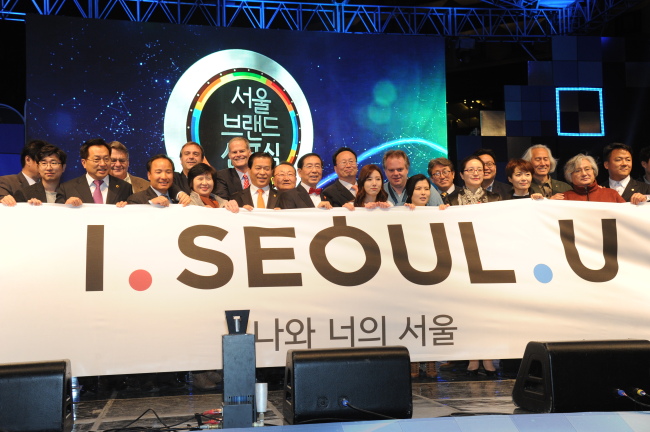The Seoul Metropolitan Government selected a new slogan on Wednesday, seeking to revamp its brand image and entice more tourists.
In a ceremony held at the city’s public square Seoul Plaza, the city announced that “I. SEOUL. U” won the logo contest, beating two other candidates — “Seoulmate” and “SEOULing” — to replace “Hi Seoul,” the current slogan that had been used for 13 years.
Some 58 percent of voters supported “I. SEOUL. U” in a poll that consisted of online votes by citizens and an on-the-spot vote by a panel of residents and experts. In the on-the-spot poll, all nine experts and 682 out of 1,140 residents supported the new logo.
“With the new logo, I wanted to show the ever-changing vibrant and dynamic image of Seoul that we need to build,” said Lee Ha-rin, a Korean undergraduate who won the slogan contest in which 16,000 participated.
 |
| Seoul City Mayor Park Won-soon (center) and guests hold up a placard with the city’s new brand, “I.SEOUL.U,” at a ceremony held at Seoul Plaza on Wednesday evening. Yonhap |
Since late 2014, the city has launched a crowdsourced campaign for a new slogan to replace the current one — “Hi Seoul, Soul of Asia,” — which the city administration considered to be difficult to use in China, the country accounting for the highest number of tourists to Seoul. In 2006, China banned the use of the expression “Soul of Asia.”
But some public relations experts and expats pointed out that the new slogan might not communicate well with those who reside in English-speaking countries, suggesting that the brand fails to capture the sophisticated image the city is trying to promote.
“I am not sure what they are trying to convey. It sounds like ‘I saw you’ or ‘I sold you.’ If they were trying to say that Seoul connects me and you, it might make sense a little, but not much really,” said a 30-year-old American English teacher.
Faced with mounting criticism, the panel that spearheaded the campaign to adopt a new slogan said in a statement Monday that the new slogan would grow on the public over time and would be understood by foreigners.
“It is quite natural to feel it’s awkward when the city introduces a new brand. It is quite common to see such awkwardness in other global cities that tried to build their own brand. The public will embrace the new slogan over time,” the statement said.
“Also, considering that the slogan is a brand, we need to look at it outside of grammar rules. We have already collected the opinion of experts in English and they said the logo is communicable in modern English,” said the statement.
By Yeo Jun-suk(jasonyeo@heraldcorp.com)

